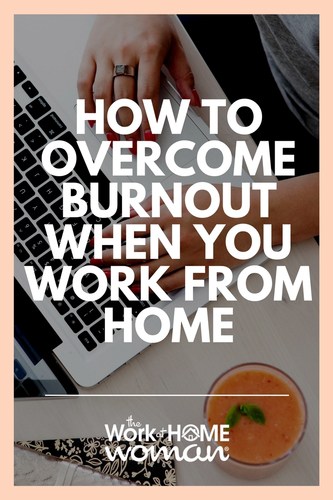 When it comes to burnout, we tend to associate the concept with corporate office roles more than we do work-from-home positions. After all, how does one burn out when they can set their schedule, relax their dress code a bit, and do what they are truly passionate about in the comfort of their own home?
When it comes to burnout, we tend to associate the concept with corporate office roles more than we do work-from-home positions. After all, how does one burn out when they can set their schedule, relax their dress code a bit, and do what they are truly passionate about in the comfort of their own home?
The reality is that burnout can happen to anyone, regardless of their location. Christina Maslach, an APS (Association for Psychological Science) fellow and professor emerita at the University of California, Berkeley says that there are six components within a working environment that can lead to burnout. These include workload, control, reward, community, fairness, and values. If one or more of these components do not match our needs, it is possible to burn out.
So, what can home-based workers do to make sure that this does not happen to them? Or, in the event that burnout is slowly creeping up on you, combat the feeling and get back into the zone?
Here’s a look at a few strategies that can be implemented to help prevent burnout.
1. Establish a burnout prevention strategy
Traditional 9-to-5 positions have human resources departments that are equipped to deal with situations like these and understand the best techniques for retaining talented employees. Working from home, on the other hand, doesn’t exactly afford the same luxuries. When you are your own talent and can’t quit, what can you do? The answer is to establish a strategy that addresses how to prevent burnout.
The three main parts of burnout include exhaustion, cynicism, and inefficacy. Your strategy should be able to address all three with actionable practices you can implement quickly to get back into the zone.
Here are a few helpful examples.
- Exhaustion. Make it a point to invest in self-care. Go to bed earlier, pencil in some time to exercise, and cut out caffeine and sugary foods in favor of snacking on veggies with hummus and drinking water.
- Cynicism. If you lack focus or can’t engage with the work you do, go out to lunch with the client to discuss new approaches to the work you’re doing. Outside of work, you may also find it’s a good idea to volunteer your time to those in need, such as helping out at a soup kitchen. These actions will help get you outside of your work bubble and allow you to feel as though you made a difference in your community.
- Inefficacy. This is sometimes referred to as imposter syndrome—when one feels as though they are secretly a fraud and everyone else can tell. Surround yourself with a tribe of like-minded individuals who will be there to encourage you and help lift you up. Remember: You are on your own journey, and it will not be like that of anyone else.
2. Get proactive by refocusing your efforts
Burning out is a little like being on a train chugging along the railroad tracks. Suddenly, it begins losing steam. Eventually, the whole train slows to a complete halt. Maybe it will try to fuel back up again and keep going. Or perhaps it will stay put, too worn out to keep trying.
If you feel like that train, the best thing to do is to keep moving forward. However, being proactive doesn’t always mean keeping with the same routine.
Take a moment to reflect on what you are doing and why it matters to you. Pinpoint moments along the way where you felt like the meaning began to get lost in the shuffle. Maybe you brought on too many clients at once and put yourself on autopilot to keep up with everyone’s needs. Or, perhaps you were caught up in the day-to-day workload that didn’t allow you to pause and take on a new, challenging assignment. Once you have an understanding of where you began losing steam, you can introduce projects full of meaning into your agenda. You’ll look forward to the work ahead, and that will help you to re-energize all over again.
3. Leave the house for a long weekend.
The cynical side of burnout will tell you that this is a bad idea. All long weekends come to an end, and before you know it, you’re back at home faced with all of the deadlines you were trying to leave behind. If you have a burnout prevention strategy in place, however, you’ll know better than to listen to that cynic.
Sometimes it isn’t enough to encourage someone who works from home to step away from their desk for a few minutes to clear their head. Instead, get away for a long weekend. Go to the lake, head on a road trip, or go camping with some friends. The goal is to get out of the house and unplug to replenish your creative flow. Sure, you’ll head back to work with assignments to finish, but that’s to be expected. You’ll return recharged with a fresh perspective that would not have been there if you hadn’t of taken advantage of your long weekend!
How do you overcome burnout in your day-to-day routine? Drop us a note, we’d love to hear from you!










Leave a Comment